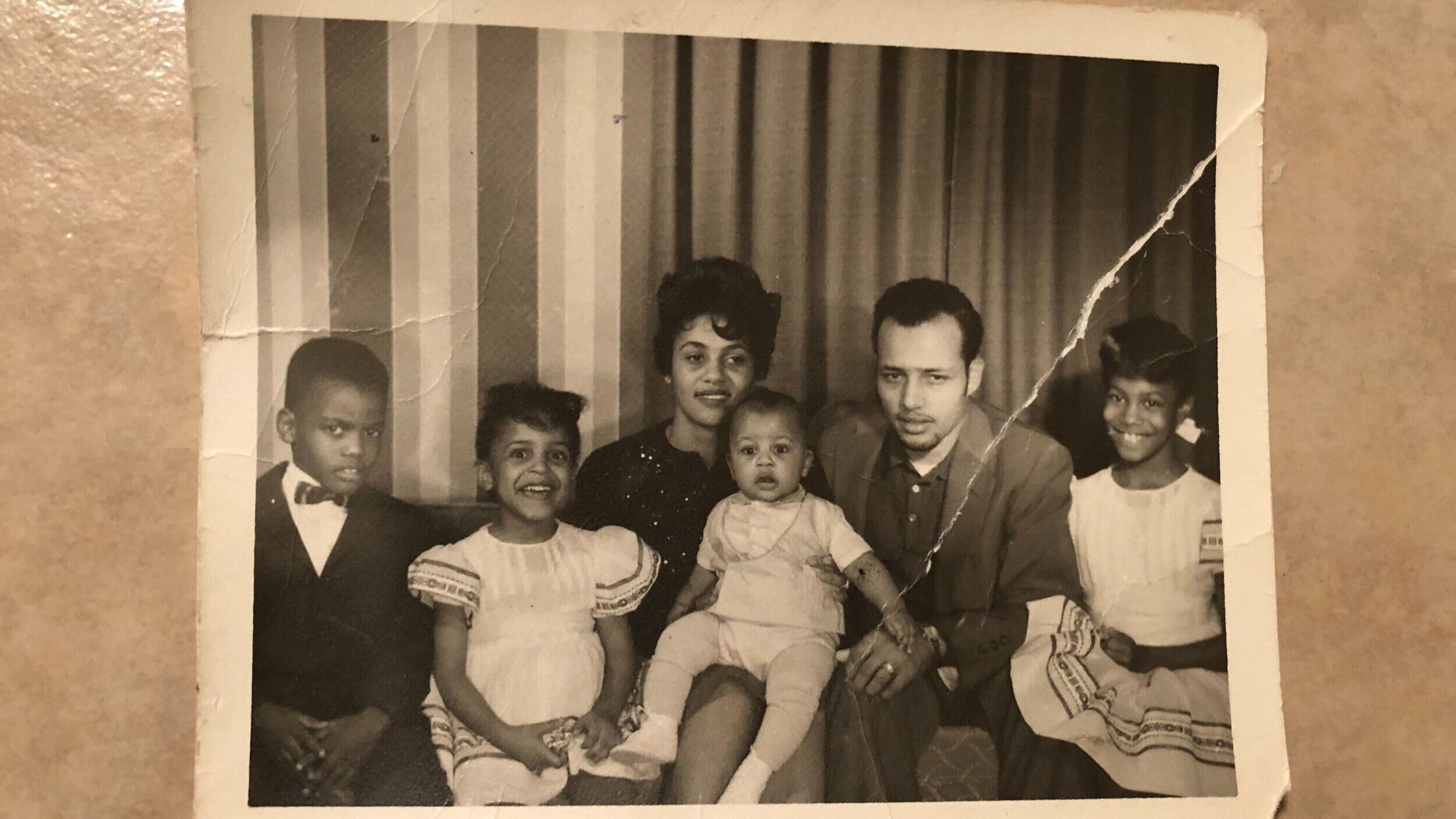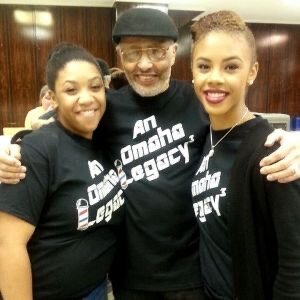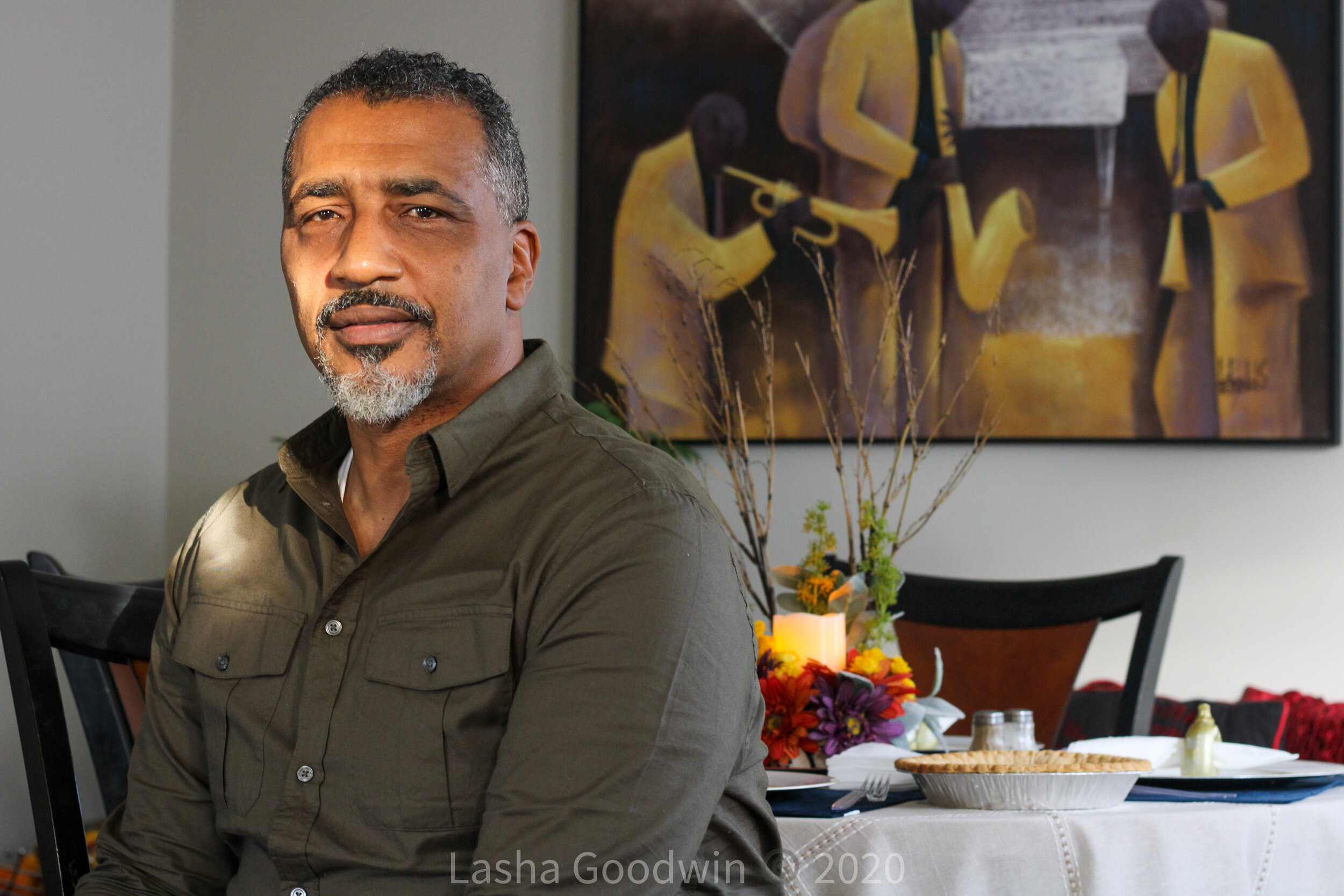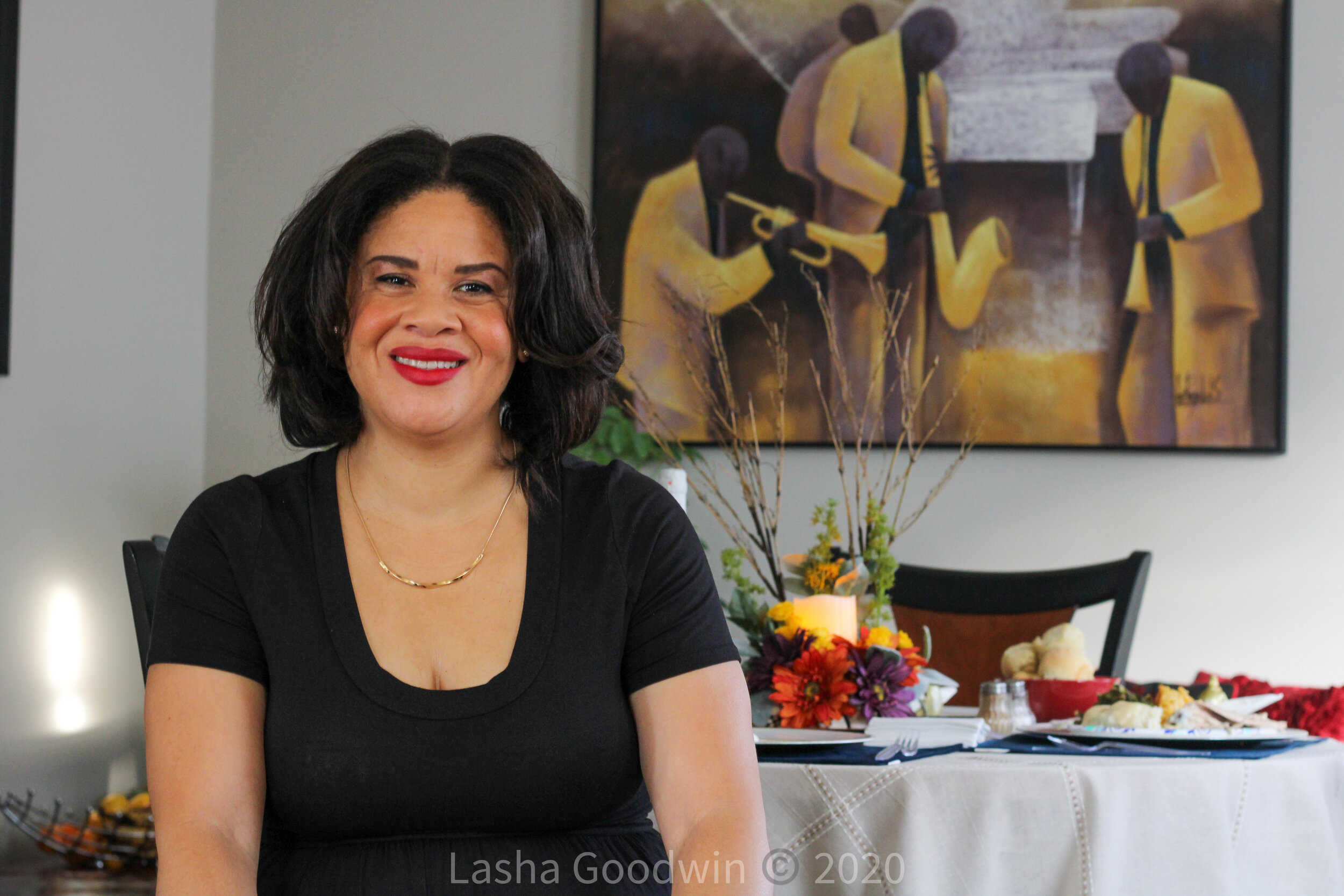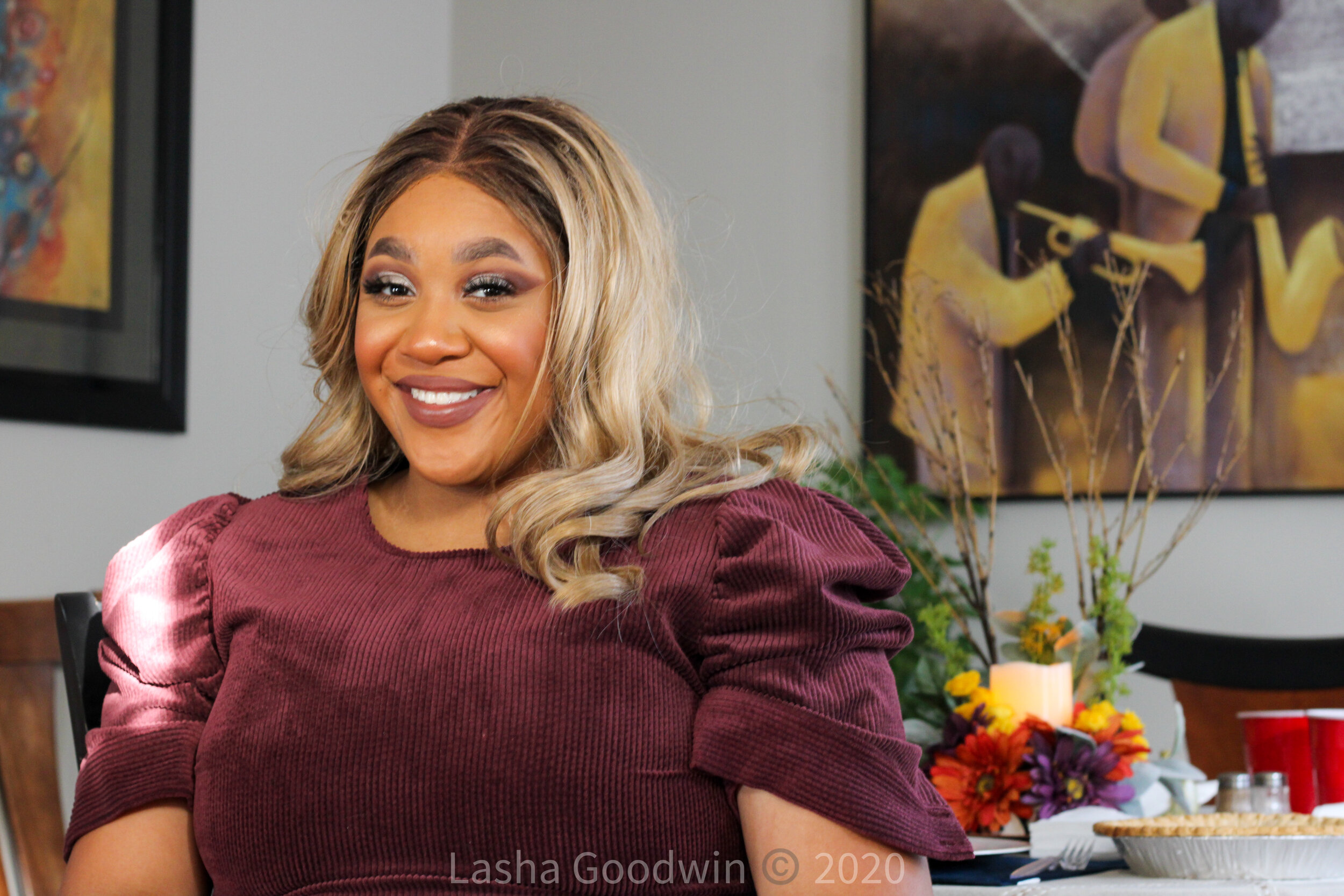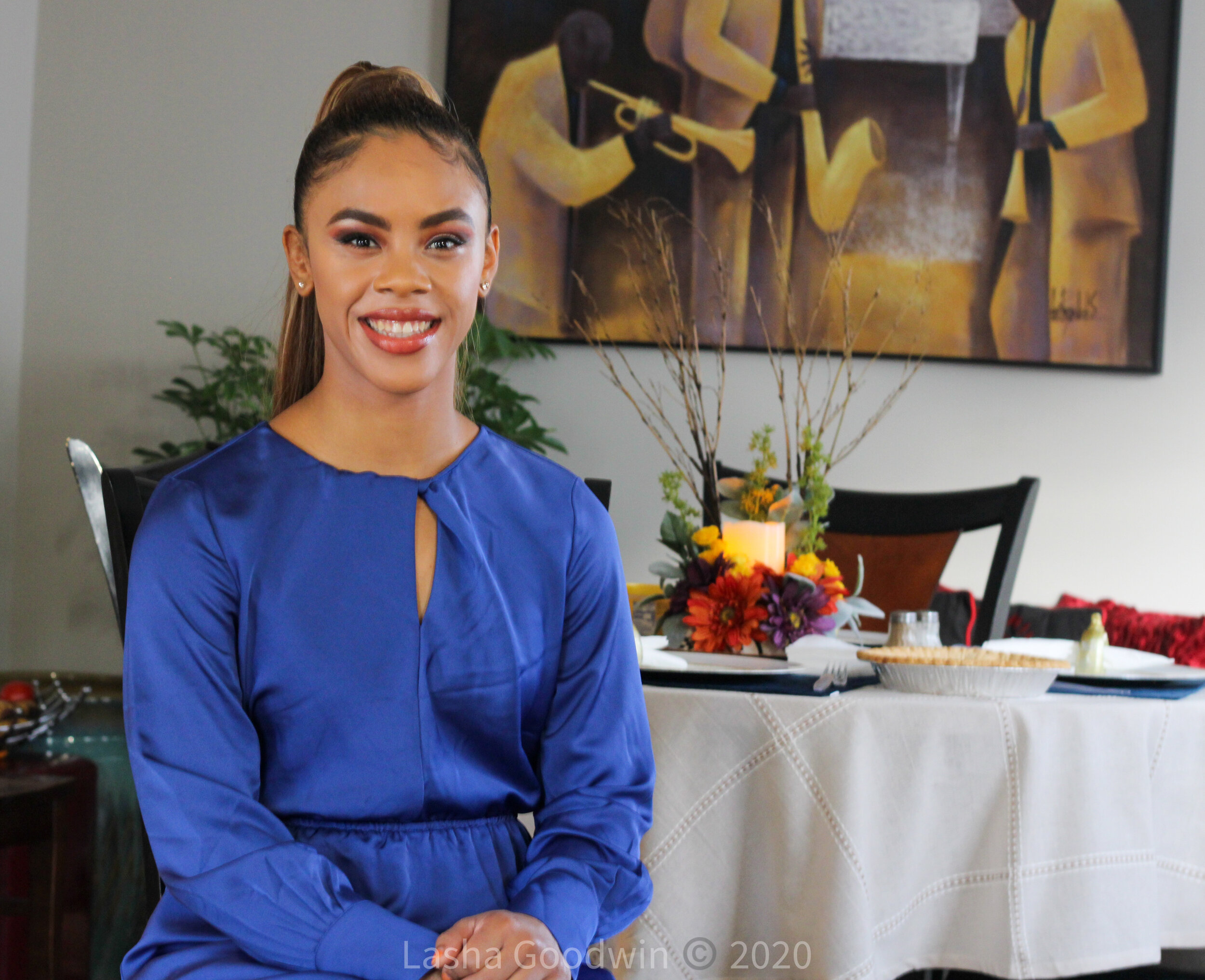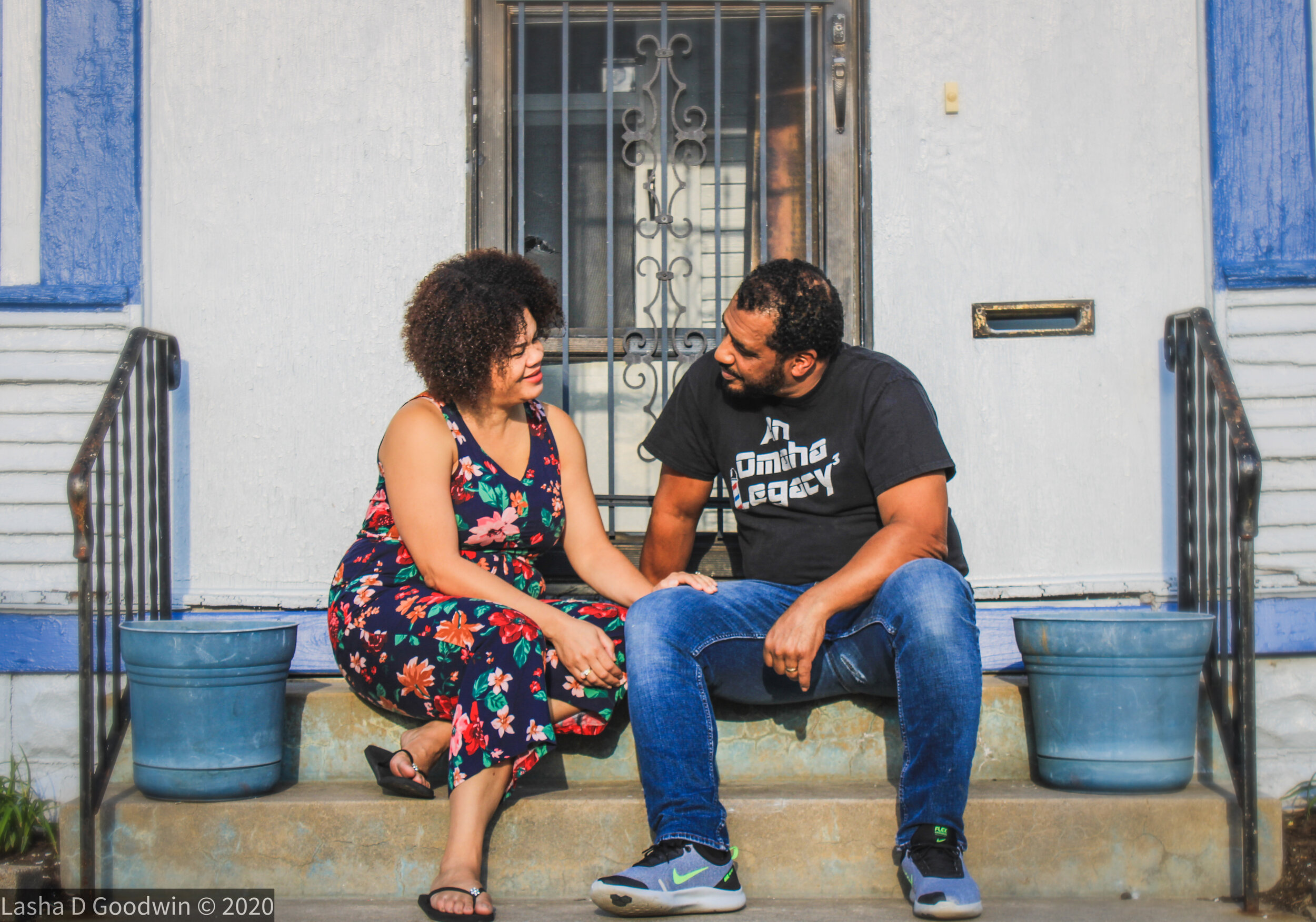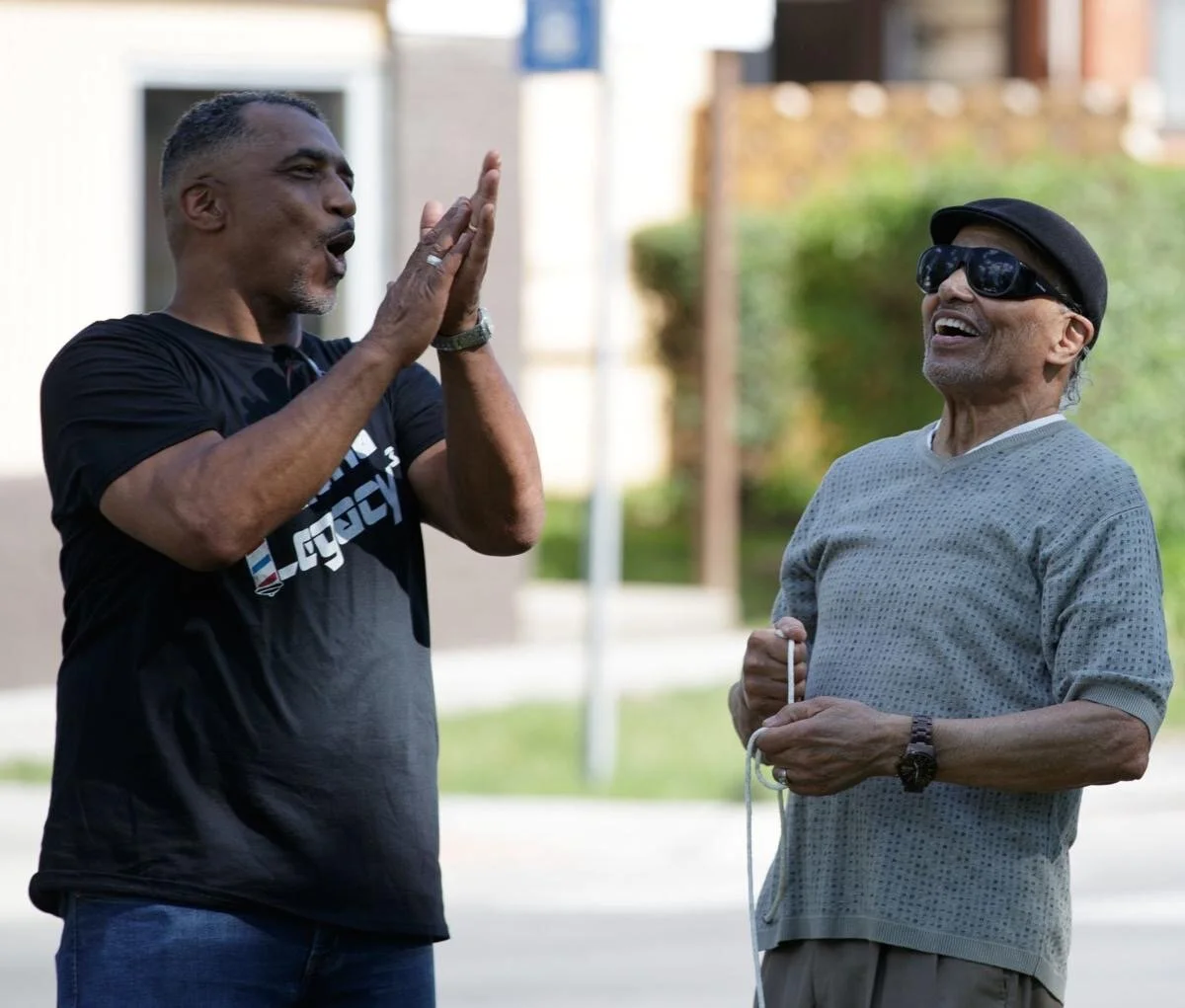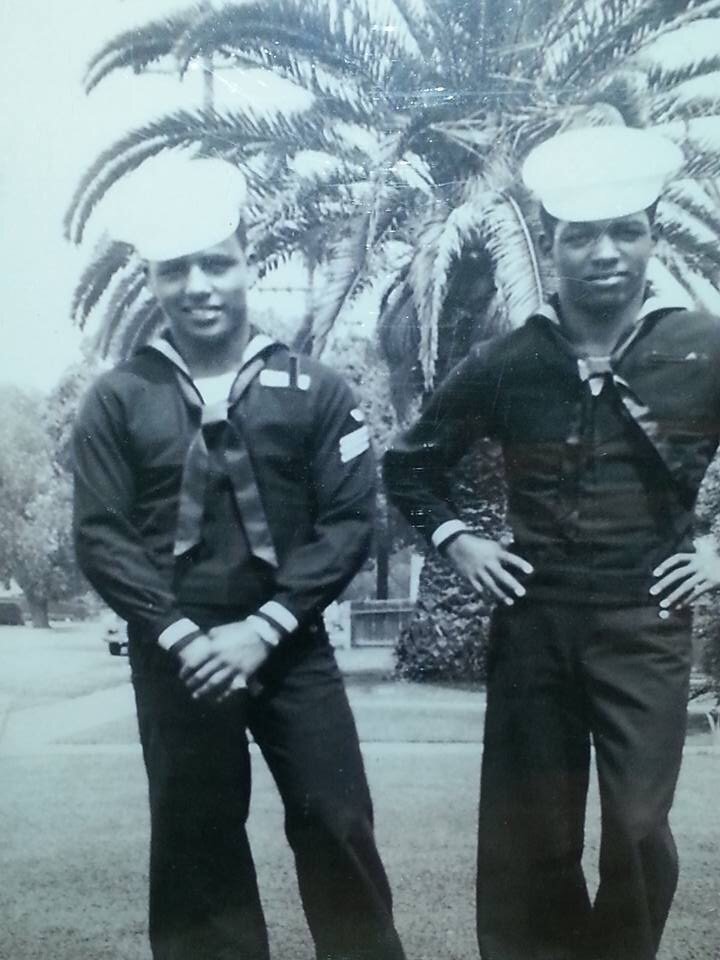Black Legacy Families, Installment II: The Goodwins
(From left) Maurice, Melody, Andrea, Daniel M.,Jr., Daniel M., Sr.,Daphne Goodwin. Photo Courtesy of Andrea Goodwin Photo courtesy of Lasha Goodwin
The Goodwins
Taking up the mantle generation by generation: The Goodwins make community their business
Four generations of Goodwins have aspired to affect positive change in northeast Omaha through their social capital investments. In their roles as entrepreneurs, activists and community leaders, they are well-positioned stakeholders and influencers who leverage their history and enterprise in the area.
by Leo Adam Biga
Representing the clan’s old guard are cousins Dan Goodwin Sr., 89, and Alvin Goodwin, 82, who made the family name synonymous with civil rights and economic development, respectively. Their fathers were brothers who came to Omaha from Alexandria, La. in the Great Migration. Dan, a preacher’s son, is one in a long line of barbers in the family. The tradition began with his brother John. After serving four years in the U. S. Navy, Dan used the GI Bill to study for his barber’s license, then secured a small business loan to open his own place in 1955 at 23. The original location was 3122 No. 24th Street. He later purchased and renovated the adjacent building for the shop’s new home at 3116 No. 24th Street, where it remains today. The shop celebrated 65 years in 2020 before COVID hit. Quite a run given he never intended making it his career, only pursuing it after he encountered hiring bias in civilian life.
“ “I didn’t think I was going to stay with it, but I don’t like to start something and not finish. The next thing I knew I was making a comfortable living.” ”
Goodwin’s Spencer Street Barbershop became a community hub when charismatic Ernie Chambers barbered there – his chair a bully pulpit in calling out systemic racism. “Ernie played a big role in giving the shop extraordinary notoriety,” Dan said. “He would challenge things he saw were wrong. He could articulate like nobody I’ve ever known. He always had answers. He did his homework. He knew what he was doing and saying. People were really impressed with him.” From the barbershop, Chambers built a grassroots base that got him elected to the Nebraska Legislature. The shop served as his campaign headquarters.
Meanwhile, Goodwin was active in the 4CL (Citizens Coordinating Committee for Civil Liberties). “It was an action group. We believed in going out and demonstrating. We integrated different places and petitioned for jobs and open housing. We marched on city hall. We were considered troublemakers. That’s what it takes to get the changes,” said Goodwin, who attended the 1963 March on Washington and 1995 Million Man March. The pair publicly denounced the 1969 wrongful police killing of Vivian Strong. Fifty years before George Floyd, they got arrested for their good trouble in decrying police misconduct. The pair are forever linked by the 1966 Oscar-nominated documentary A Time for Burning. Memorable footage shot in the barbershop captures Chambers deconstructing racism in full rhetorical splendor to a cowed white pastor. Goodwin is pictured cutting the hair of his son, Dan Jr., while listening to his eloquent friend speak hard truths. On the walls are glimpsed articles, photographs and symbols of Black oppression and pride in keeping with the shop’s role as a grassroots social-cultural-political center.
“The film depicts the ‘Black City Hall’ feel that’s authentic to the barbershop,” said granddaughter Lasha Goodwin, who photographs the Black experience for various media outlets. The film aired nationally on PBS. Goodwin accompanied Chambers on a speaking tour in conjunction with screenings and town halls. The free, spirited discourse Goodwin encouraged at the shop made it a touchstone. So much so, its namesake had a portion of North 24th named for him. He made the shop what the late photojournalist Rudy Smith called an institution of higher learning. “That’s exactly what it was,” Smith said. “It fostered an arena of ideas. The barbers there were like teachers and professors.“It wasn’t just about the politics and racial stuff, it was about persons who knew how to carry themselves,” said Dan’s wife, Andrea Goodwin. “They pushed education, people getting self-knowledge, digging into things to find out information for themselves, not just accepting the latest political agenda. I think young people needed to hear that to know really what’s going on and what they’re really fighting for.” Her husband kept intact bullet holes in the bullet-proof front window as reminders of societal forces disapproving of the militancy espoused there. Those scars, in turn, prompted discussions about standing up to injustice.
“It wasn’t just about the politics and racial stuff, it was about persons who knew how to carry themselves.”
Setting the standard and holding onto what’s ours
Life lessons flowed inside. Dan was joined by two of his barber brothers. A cousin and nephew also barbered there. Chambers and Goodwin, who remain close today, cut quite the figures with their ripped physiques (they’re lifelong fitness buffs) and sharp wits. They epitomized strong Black men speaking truth to power. The intellectual Chambers was the street poet and prophet. Goodwin, the Everyman ballast to his polemic riffs. They invited vigorous debate and curiosity, challenging assumptions, variously serving as sages, foils, mentors and role models. “You learned the most basic things of even being a man in the shop,” said grandson Daniel Lee Goodwin. “I learned how to look a person in the eye, a certain respect in greeting a person, even the nature of conversation of men and a certain pride in the way you carry yourself. All those different elements were innate in us because of the barbershop experience.”
According to Lasha, “authenticity” describes how the family’s patriarch created a community magnet. “It makes sense people would gather where they could be authentic and cared for, especially during an era where people were oppressed simply for how they naturally appeared in this world.” Back in the day, Black business owners got approached for loans and Dan was a soft touch, knowing full-well he wouldn’t get repaid in many cases. “People would call every day with their problems, asking for money,” he confirmed. “Dad’s generosity is legendary,” added his son, Dan Goodwin Jr., who said he’s heard about his father’s munificence from those he helped. “The barbershop was like a bank. He helped people with their mortgages and their bills. “He has been instrumental in helping a whole lot of people, young Black men particularly, not only with advice but putting money in their hands at times,” Alvin Goodwin said. “No one’s turned away,”Danielle Goodwin said of her grandfather. “Anyone could sit in his chair and he’s going to treat them right.” A natural hair stylist, Danielle is the fourth generation to take up the family trade. She works with her siblings Daniel Lee Goodwin and Nelson Goodwin, who own Groom Services. Daniel said his elder’s example “made me follow in his footsteps to become a barber,” adding, “You feel that responsibility. It’s a lineage thing. I’m adding to that fabric the best I can.” Said Nelson, “We’ve gotten values from this place down on 24th Street, an area most people don’t have the most positive viewpoint of, but there is a product that comes out of there that we want to share with all of Omaha.” Grandma Andrea sees Groom Services as “an extension of what started years ago and that seems to have went through the family.”
(Left)Lael Goodwin, Daniel M Goodwin Sr, Lasha Goodwin 2015
As a master barber, Dan Sr.’s had many young barbers apprentice under him. Once they learned the craft and interpersonal skills that go with it, some, like David Warner, started their own shops. “Grandpa did not set out to be some relevant do-gooder,” Lasha said. “That’s purely who he is. Kind and generous. Bold and passionate. With a strong sense of justice. He's very principled.” Goodwin ascribes his principled ways to his devout Christian parents, Joseph and Martha. “They were the best examples of their belief and living that life of anybody I know. They reared us properly. They always emphasized getting an education. Despite all their experience of living with racism they raised us to treat all people the way we wanted to be treated. “Grandpa’s biggest thing is to live by the Golden Rule,” Lasha said. “But he won’t take no mess,” Dan Jr. added. “I am a person that doesn’t bother anyone,” Dan Sr. said. “But sometimes people mistake meekness for weakness.”
In the Navy – nine siblings served in the military – he was the object of slurs from some fellow enlisted men. Fights ensued. “They would say things around me that I couldn’t tolerate and I would challenge it. I had to react. I wouldn’t start anything, but I wasn’t going to take anything.” That doggedness kept his shop afloat seven decades. It survived the turmoil of the late 1960s and held on in the decline that followed. Now that North 24th Street is poised for resurgence, the two-story brick building housing the shop and the business itself have passed from its founder’s hands to his son Dan Jr. and daughter-in-law LaVonya Goodwin.
A major renovation underway at the historic site funded by Community Development Block Grant dollars has coincided with its closure during the pandemic. Keeping the business in the family is strategic. “Succession planning is a buffer against gentrification,” LaVonya said. “When there’s a plan in place for the family to secure a property properly by way of taxes, estate planning, it’s the buffer. No one can come in and take what’s yours when you own it. That’s what we did in 2015. We said let’s make dad and mom a part of this transition versus it being a sorrowful thing once they’d passed on. So they’re around to get the benefit of truly seeing the fruit of their labor. “I definitely feel real good about it,” said Dan Sr., who’s satisfied his heirs are spearheading the improvements he long desired to do on-site. Alvin Goodwin recognizes his family is filled with change agents. “We come from good stock. I wouldn’t expect anything different.” The family is consolidating its holdings in the corridor. A lot next to the shop is home to a community garden developed by Global Leadership Group (GLG), a grassroots organization led by Dan Jr. and LaVonya. GLG also does community cleanups. “I like to emphasize that 24th, from Spencer to Wirt, is Black-owned,” said LaVonya, who manages various aspects of property management with her husband.
(From Left) Lael Goodwin and Lasha Goodwin Photo courtesy of Lasha Goodwin
The cachet the family carries helped get the North 24th Street Business Improvement District she advocated for approved. She serves as its president. “The name evokes credibility and trust because people know what the Goodwins have already done and continue to do for that community,” she said. “There’s a track record and some goodwill there that says, ‘She’s probably going to get it done because we’ve seen them get it done before.’ You could always count on Goodwin’s being open. It’s a reputable, family-friendly business.”
The BID is now managing the former Love’s Jazz & Arts Center after the city pulled the lease from the previous administration, In her BID role, LaVonya is overseeing changes to the 24th and Lake fixture, including a revamp of its programming, leadership and staff. The couple value the family’s multi-generational brand. “Often-times when I meet people and tell them my name,” Dan Jr. said, “they proceed to tell me, ‘Your dad cut my grandpa’s hair, my dad’s hair, my hair, my kid’s hair.’ I get that a lot.” That continuum of serving others, Nelson Goodwin said, extends to how family members feel obliged to conduct themselves. “It’s an unsaid expectation. You have these examples in front of you and you need to follow through.”
Dan Jr. and LaVonya’s daughter Lasha follow their community orientation. The former real estate agent is a neighborhood planner in the Omaha City Planning Department. She’s also active in GLG. “My passion has always been about how do you restore where people live, work and play to support them living a healthy life.” From a young age Lasha and her sister Lael were introduced to volunteering by their parents. “Volunteering is kind of the way we live,” said Lasha. The sisters also grew up with displaced youth their parents took into the family home. Andrea is heartened by her descendants’ civic engagement. “They’re doing things I never envisioned trying to build and lift up what we call the North Side. Things that encourage others to stay involved with making it a positive experience to live in this community. They have a passion for being part of Its growth.”
LaVonya noted Goodwins have done due diligence for their North O endeavors. “We talked a lot about what we envisioned before we fully knew how to get there and things materialized. Sometimes we didn’t realize the hard process we were in was preparation. Owning a small business was a springboard for the garden. The garden was a springboard for the BID. At every step there was a need that needed to be filled With GLG we never really set out to do cleanups, but we just realized it needed to be done.”She’s learned. “Sometimes you’ve got to be willing to get your hands dirty and do the work on the back end when nobody’s watching and nobody cares. You’ve got to be willing to fail, too.” Guiding their actions, Dan Jr. said, is a desire “to be a part of creating a vibrant community. It’s bigger than us,” he added. Alvin Goodwin can relate. The Omaha Economic Development Corporation he founded sprang out of a similar intent. “When we started, many professionals advised us not to do redevelopment in the area. ‘How are you going to attract people into the area they asked?’ But we put together a public-private community-based partnership that raised and leveraged more than $19 million to complete development over a 10-year period for Kellom Heights,” Goodwin said. More projects followed. Such efforts, LaVonya said, represent the family” carving out a lane” in economic development through “the groundwork laid by cousin Al and the inroads made by OEDC.”
While there’s been economic progress on the North Side, poverty remains an issue as do gaps in housing, jobs, services, amenities. “It’s hard right now living and doing business in North Omaha,” LaVonya said. “But, you know what, it’s worth it. We’re worthy and capable of pursuing the hard part of developing it,” Despite the rough patches, she sees promise. “I’m on the ground every day and I know the life on North 24th Street. I know the businesses – who’s running them, when they’re open, what they’re doing, their challenges, their contributions. The beauty of neighborhood work is you get to know the ins and outs of a community.” She’s participated in the Forever North initiative for new housing and transportation options. She supports the expansion of the North Omaha Trail, she said, as a means to overcome the lingering disruption and isolation the North Freeway imposed. “This trail is connecting North 30th Street to downtown in a way that’s getting people to navigate through this community versus just driving through it. There’s a difference. Trails can invite people in, in a way that the North Freeway cut people off.” In order for the area to thrive, Dan Jr. said, “Our community needs businesses, not nonprofits. We need stores, we need shops, we need things that generate revenue and provide jobs. We need places that bring people into our community.”
Dan Sr. built the family’s legacy business during North O’s heyday. Then things got tougher. Yet he endured “The state of the community made it hard to do business there,” LaVonya said, referring to disinvestment that resulted in empty lots and abandoned buildings. “Loans were hard to come by. But we weren’t raised with excuses, We’re doers as a family. “There were hard times there where business was kind of shaky,” said Andrea. “My husband took part-time jobs out of the city with his brother Nate, who had his own construction company.” Summers, Dan Jr. worked some of those jobs with his father and uncle. Dan Sr. also drove a rig for a local trucking company to help make ends meet. That work ethic of doing whatever it takes to make it runs through the family.
Alvin Goodwin admires how his cousin “hung in there through lean years,” adding admiringly, “He’s always managed to stay. “When it comes down to it, not many of us have that type of sticktoitiveness,” Andrea said. “He put all of us through college – our four kids and myself. That was a big motivation to keep him pushing.” “My thing was always wanting to be able to take care of my family comfortably.” Dan Sr. said, Then there’s the family’s intentionality in remaining in North O. “At one point the barbershop was doing so well we could afford to move west,” Dan Jr. recalled, “But we were all like, no. We did not want to move from North Omaha. So my parents are still in the same house that they bought in the ‘50s.” Ernie Chambers appreciates his friend’s commitment to community. “It lets people know not everybody who could go someplace else is going to do that. This is home and this is where we stay. People do need to see that, especially the young ones. When they can see people like Dan who are in a position where they don’t have to hang around, but choose to, it lets them know there’s something of value in our community and a benefit to staying here.”
Reaching back and moving forward
“I think one of the things our family does is bring an important generational context,” LaVonya said. “As much as you need the energy of the youth, you’ve got to have the context that reaches back. Our family has a relentless belief that we are worthy and capable of everything we desire. “We’re accomplished people for such meager beginnings,” said Dan Jr. A merchant account manager for PayPal, he didn’t have to look far for inspiration. His mother Andrea went back to school in her 30s, graduated from college and was a social worker and behavioral health specialist with Catholic Charities, Boys Town and inner city schools. “She became very pivotal in the lives of young women who had been through a lot of trauma and abuse,” he said. “She’s very well known in those circles for mentoring and helping women to heal. “I’ve modeled a lot of how I am as a wife watching Andrea,” LaVonya said, “because she raised four children and ended up with this very successful career. I’ve learned that balance to know who I am as a leader in the community as a working woman but to also make sure my family has a home.” Dan Jr.’s sister Melody Newson went back to college for her medical degree. She’s a psychiatrist at the VA Medical Center. Cousin Randy Goodwin is a successful television actor (Girlfriends, The Vampire Diaries), who recently starred in a feature film he also wrote-directed-produced, The Job.
(From Left) Lael, Lasha, LaVonya, Daniel M. Goodwin, Jr. at the 2018 Aksarben Ball Photo courtesy of Lasha Goodwin
The cousins are proud to have an uncle, Lawrence Timothy Goodwin, who retired from a 30-year career in the U.S. Navy with the rank of lieutenant commander. His unlikely climb in the service began inauspiciously, when he lied about his age to enlist. Officially, he was 17, but he was actually 15. He earned his GED and made a career in the Navy. His son Tim Goodwin is an ophthalmologist. Another uncle, Nate Goodwin, once headed the Urban League of Nebraska. His brother John was a beloved youth sports coach. “When we talk about 14 siblings and their accomplishments,” LaVonya said, “I think about grit and a lot of wit.” Right in the middle of the pack was Dan Goodwin Sr. “Dad may epitomize wit and grit more than any,” said Dan Jr. “When people think about a barber, they’re like, okay, honorable trade. But he is so much more. Some of the biggest things to describe Dad are consistency and compassion.” The same for his mom, who was the disciplinarian. “You’d never know that now,” he said, Granddaughter Lael said, “I definitely use my grandparents as inspiration and a picture of where I want to be when I’m their age. “They’re very warm and affectionate people,” Lasha added, “Excellent listeners. You can go to them anytime with anything and they’re going to sit and listen to you and tell you right. You’re never going to hear them tell you wrong. They’re going to point you in the right direction, make sure you’re taken care of and have everything you need. They’re always going to feed you, too.” Entrepreneurship also runs through the family, said LaVonya.
(Left)LaVonya and Daniel M Goodwin Jr. Photo Courtesy of Lasha Goodwin ©2020 Photo courtesy of Lasha Goodwin
The origins of that striving go back generations, Al Goodwin took his cue for community engagement from his mother Fannie Lou Goodwin, a Mississippi native who worked for the 1960s War on Poverty program GOCA (Greater Omaha Community Action), the United Way and the Eastern Nebraska Office on Aging. She joined Susan Thompson Buffett, Charline Gibson, Lois Mark Stalvey and others in the Omaha branch of the American Panel of Women in facilitating public forums on racism and discrimination. “She always did community service, always invested her time and energy to help other people,” he said. “So I personally had a firm foundation in reaching out, giving, sharing with others based on what my mother as well as my dad, Alvin Sr. (a Boys Town grad who made a career with the U.S. Postal Service), modeled. “We knew we had to get an education, we had to work, we knew nobody was giving it away. You had to go out and earn it and prepare yourself.”
The University of Nebraska alum began his career with the Small Business Administration in the late ‘60s before being appointed an assistant to Omaha Mayor Gene Leahy. He coordinated federal grant programs for the city and identified urban economic development opportunities. He left to form the Urban Business Development Center and then won competitive federal grants to launch the Omaha Economic Development Corporation in 1977. He led it for three decades. OEDC continues today. Its residential, commercial, mixed use projects injected critical assets into a community where few others invested.
(Left)Daniel M Goodwin Jr, Daniel M Goodwin Sr. Photo courtesy of Omaha World Herald ©2019 Photo courtesy of Lasha Goodwin
“I’ve always had a deep interest in and genuine love for my community,” he said. His family’s long been a fixture at St. Benedict the Moor Catholic Church. Goodwin and his wife Joyce, a retired dietician, sent their late daughter Karen Goodwin to Stanford University. This legacy of achievement is not lost on Nelson Goodwin, who appreciates the path his elders blazed. “I pull from those people all the time,” he said. Their feats make them seem like mythical characters to millennials and Baby Boomers. “Dan Goodwin Sr. founding one of the longest-running barbershops in the state of Nebraska. Cousin Al founding the Omaha Economic Development Corporation,” LaVonya said. “They’ve really had a tremendous impact on the community.
“The first thing that comes to mind when I think of legacy and our family,” Danielle Goodwin said, “is Black excellence. We come from a family with a principles-based foundation. That really stems from my grandparents. There’s a standard. It’s not like you’ve reached this peak. It’s literally like this continuous effort you’re putting forth.” After becoming a single mother and dropping out of college, Danielle leaned into that family resolve to resume her studies and graduate with a degree. Overcoming obstacles is a given with the Goodwins. Descendants in need of a push need only look at those who preceded them.
“Nothing was guaranteed them. Everything was always at risk of being stolen: their homes, jobs, lives. They had to rely on God, themselves and relentless hard work. How they laid the foundation for us is nothing short of admirable,” said Lasha. Resilience is a family trait. Dan Sr. is a case in point. “All the odds were stacked against him. Born a Black man in the Great Depression and coming of age at the height of Jim Crow,” LaVonya noted. “Yet his was one of the first Black businesses to cross 24th and Lake and go north. He broke a color barrier of segregation.” Lasha acknowledged she doesn’t know the struggle her elders endured. She’s certain though she’s a product of their strength. “I’m a very strong, outspoken person, not passive at all. There is something to be said about composure and that’s something reinforced by my mom and my grandmother. Grandfather-grandmother are a team. Mom-dad are a team. It comes down to respect and we do this thing together.” Danielle said her determination to return to college was directly influenced by family members “not letting challenges define you or your outcome in life,” adding, “That is a message that permeates throughout our family in what we do.”
Strength of spirit and body
From left to right; Nelson Goodwin and his wife Wendy Goodwin; Danielle Goodwin; and Jasmyn Goodwin and her husband Daniel Goodwin.
Her generation is leading the Black Lives Matter movement the same way her grandparents did the civil rights era. Dan Sr. was caught up in the cause, yet never forgot his other responsibilities. “A civil rights activist - very much on the radar of the OPD (Omaha Police Department) as a ‘radical,’” LaVonya said, “and yet he kept his family together. He made an honest living.” Andrea Goodwin supported her husband’s activism but worried for his safety. “Very definitely.” She had good reason, too. A cop once pressed the barrel of his gun to Dan Sr.s temple. Another time, a cop jammed the nose of his gun against Goodwin’s belly. Any number of Driving While Black stops could have gotten him killed. “It was a really scary time,” said Andrea. “I was afraid for the community and all those that were out there.“ The outrage he, Ernie and others expressed about over-policing and abuse of power predated BLM protests by 50 years.
Goodwin watched in horror with millions of others the video of George Floyd losing his life in police custody. “If I had been there, there’s no way I could have stood by and watched the key officer with his knee on Floyd’s neck. I would have to had run over there and try to pull him off. I probably would have got shot. It seems like that video woke up a lot of white people that maybe didn’t believe the complaints we verbalized about police.” Andrea knows he comes by his headstrong ways naturally. “I think you can say pretty much there’s a Goodwin characteristic - they’re kind of stubborn people when they get one thing in their mind. That independence nearly cost Dan Sr. his life a few years ago when one evening he ignored his wife’s plea to wait until morning to repair an upper window over their garage. He grabbed the shorter of two ladders, set it against the house, climbed atop the roof and fixed the window. Coming down he miscalculated his steps.
“I wound up falling on my back on a big concrete block. I was never unconscious, but I was in so much pain. I really thought it was over. I couldn’t move or even talk for awhile. Finally, I rolled over and dragged myself around the front, up the steps, and was able to reach up and pull the screen door open and make enough noise for my wife to hear me. She called the rescue squad. I spent two weeks in intensive care. I broke three ribs, bruised another rib, punctured a lung.” Were it not for his superb physical condition from weight training and competitive powerlifting, he said, “I would be dead. That’s what kept me alive.” Discipline and competitiveness are two more family hallmarks embodied by Goodwin, who’s long followed a strict dietary (except for ice cream and brownies) and exercise regimen.
(Left)Daniel M. Goodwin Sr, Timothy Goodwin Sr. U.S. Navy Circa 1945 Photo courtesy of Lasha Goodwin
The challenge of testing himself against others and all that heavy metal appealed to him. “I didn’t start until I was 68 years old. I won 16 straight national titles (competing in the masters division). I competed in five world tournaments. I’ve been to the Czech republic three times. I’ve been to India once. And to Pretoria, South Africa once. “It’s something I really enjoyed and felt good about. I’d give anything to still be able to do that kind of traveling and competing.” His prowess has proven inspirational. “My grandfather has made many accomplishments and strides later in his life,” Danielle Goodwin said. “For me that has made a huge impact and been an example of what you’re able to accomplish.”
She was motivated enough to take up powerlifting herself and in true Goodwin fashion she excelled, setting state records. Dan Jr. marvels his father is “still within five pounds of what he weighed when he was at Tech High.” Between hopping freight trains and enlisting in the Navy at 17, his dad didn’t get a chance to compete in organized sports. “He made sure we did,” Dan Jr. said of himself and his siblings, who were coached by their father as youths. A standout all-around athlete and running back at Omaha Central, Dan Jr. attracted recruiting interest from major colleges, including Nebraska. Father and son did “a role reversal” when Sr. started powerlifting and Jr. helped coach him.” That instinct to assist his father, he said, “came from what he put into us and the opportunities we had.” The athletic gene runs in the family, LaVonya was a track sprinter and daughters Lasha and Lael both competed in sports as well. The Goodwin with the most promising athletic future, Dan Jr., spurned an offer from Tom Osborne and the Cornhuskers by opting to go to Iowa State. Then, despite a breakout freshman season, he walked away from the game. “When young people are put in the limelight, few can handle that,” he said from experience. “You kind of lose yourself because at that stage in life you’re trying to figure out who you are anyway. I kind of got caught up in having too good a time and not being focused. I realized this is not me. I didn’t like who I had become.”
Standing firm in community
A born-again experience centered him in faith and service. “I honestly believe it was a decision that saved my life,” he said. An English major at ISU, he was part of an action group that successfully lobbied for the new football stadium on campus to be named after the school's first Black player, Jack Trice. He left ISU to earn a journalism degree at UNO. After a failed first marriage, he and LaVonya met volunteering at church. Aligned in spirit, they married 28 years ago. He did prison ministry and was a facilitator-presenter with Monster.com. She was a manager for web-based med firms and a program administrator at Heartland Hope Mission. Though she mostly grew up in South Omaha, a family crisis brought her to North Omaha. It was only after she met her husband she realized her family owned a long history on North 24th Street and ever since then her passion for the area has matched his. The family’s all-in on contributing to North O reblossoming. “I have many plans and ideas,” Lasha said. “I may be a lawyer or a developer or a restaurateur. In the near future, North Omaha will be a place where people thrive, place roots, establish businesses, come for world class entertainment. Count on it.” Her younger sister Lael is still searching for her precise niche, but she’s certain family and community will be paramount in it. Whatever Goodwins do individually or collectively, their guide post will always be their dedicated family patriarch. “Dad’s just a no-nonsense guy. He loves life. He loves the North Side. We have nothing but utmost respect for what he’s done. That’s why we want to make sure his legacy lives on,” Dan Jr. said.
(Left) Lasha Goodwin (Right) Lael Goodwin at the Global Leadership Group Community Garden 3118 N 24th Street Photo courtesy of Lasha Goodwin
“Everything I do is in honor of my grandfather,” Lasha said. “We owe it to him to work just as hard with the freedoms and opportunities we are afforded to restore our community. I have resolved we have a responsibility not to just bask in, ‘Oh, we’re Goodwins,’ but to continue that legacy of the family business and also the generosity and community engagement. And like let’s take it to the next level.” He acquired a legacy that now simply we’re going with,” LaVonya said. “To make no bones about it, we are standing upon his shoulders. Not only on his good name, but also his hard work.” As for Dan Sr. himself, he said, “I never thought of myself as setting a legacy. It’s a heck of a compliment.” Andrea is glad family members have a legacy that connects them. “If they can think back and hold onto the positive things we tried and are trying to leave for them, I feel very good.” Al Goodwin appreciates that foundation. “We’re fortunate we have a family that stuck together in rough times, good times. We believe in family.” It all comes back to community. “We’ve always loved our community,” Dan Jr. said. “We were taught to love our community and to love people.” A legacy built on love not to be taken for granted. “Sometimes in families legacies get lost and that’s what we didn’t want to happen,” Lael said. “So we just push through. It’s really been a family effort. We’ve put in the work to make things happen.”
Daniel M. Goodwin, Sr. and Andrea Goodwin. Photo Courtesy of Life is Goodwin Photography ©2020. Photo courtesy of Lasha Goodwin

